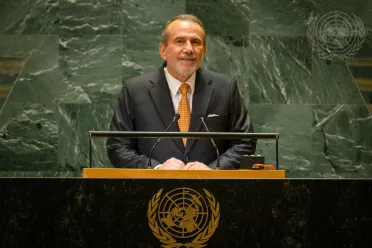Statement
Statement summary
ELMER SCHIALER SALCEDO, Minister for Foreign Affairs of Peru, said that his country — “just like the rest of the world” — has worked to mitigate the political instability and economic crisis caused by COVID‑19. This has included efforts to recover the pace of economic growth, “boost projects stuck in their tracks” and attract investment to develop large infrastructure projects to create decent jobs, he said, adding: “Today, I can say that we are seeing the first results of these efforts.” Yet, there is much ground to cover, and multilateralism is the best tool available, he said, to achieve “the conditions we require to achieve sustainable development”. The first of these — “without a shadow of a doubt” — is peace, and he stressed that the current reality “is testament to the fact that we are failing” the Organization’s fundamental aspiration to save future generations from war.
Condemning all use of force in international relations, he also said that paralysis in the Security Council “when it comes to some conflicts” requires reform and revision of “the prerogatives of its permanent members – mainly the right of veto”. Exercise of that right, he added, is sometimes motivated by politics, rather than the need to address humanitarian matters. For its part, he said that Peru will continue to support disarmament, arms control and nuclear-non-proliferation initiatives, also appealing to nuclear-weapon States to “renew their bilateral commitments to reduce their respective arsenals”. Additionally, Peru will continue contributing to UN peacekeeping operations — “as we have done since 1958” — and he noted that more than 250 members of Peru’s Armed Forces and national police are currently deployed in UN uniform. Further, a 200-strong rapid-response force is available for immediately deployment “whenever the United Nations requires it”, he said.
He went on to state that the second condition required for development is a clean and healthy environment. This is why Peru, alongside others, called on the International Court of Justice to rule on States’ international climate-change obligations. Welcoming the UN system’s support of Government actions to assist people affected by Cyclone Yaku in 2023, he reported that Peru has adopted a preventive approach for disaster-risk management in line with the Secretary-General’s “Early Warnings for All” initiative and the Sendai Framework. Further, the Government is working to achieve carbon neutrality by 2050. Emphasizing, however, that “these domestic efforts are not enough”, he called for increased international cooperation according to the principle of “shared but differentiated” responsibility. Developed countries must reduce their emissions and honour climate-finance commitments, which include — “at a minimum” — $100 billion per year for developing countries as well as implementation of the loss-and-damage fund agreed at the 2022 United Nations Climate Change Conference.
Turning to the SDGs, he noted a more than 10 per cent increase in national resources allocated to their achievement and highlighted three priority areas in this regard — health, education and social protection. Specific efforts include swift action to reduce the lethality of a recent dengue epidemic; efforts to ensure that young people can access the labour market; and programmes supporting the most vulnerable through soup kitchens, canteens and shelters. The Government also works to guarantee the collective rights of Indigenous and Afro-Peruvian Peoples through the provision of services that recognize “that we are a multicultural, pluri-ethnic and multilingual country”, he said. Noting again, however, that “domestic efforts alone are not enough”, he called on developed countries to keep their promises to provide assistance and financing. He added that the international community must “revise the way we measure progress”, as GDP cannot measure inequality, well-being or environmental sustainability.
Full statement
Read the full statement, in PDF format.
Photo

Previous sessions
Access the statements from previous sessions.
